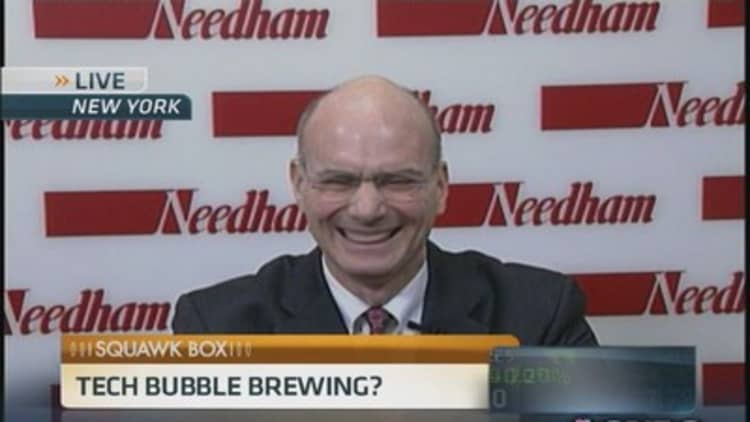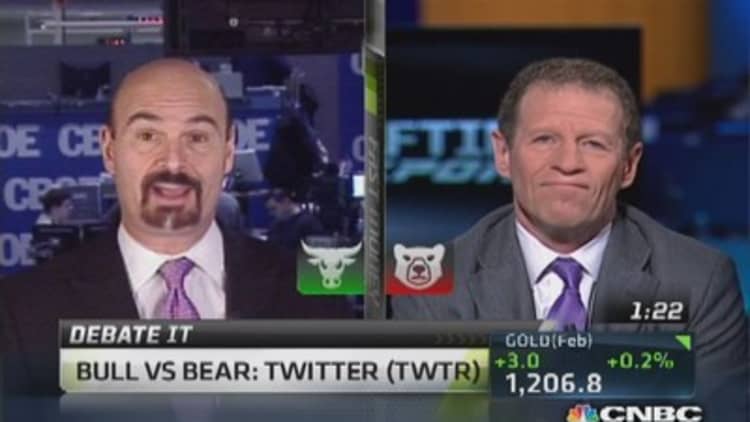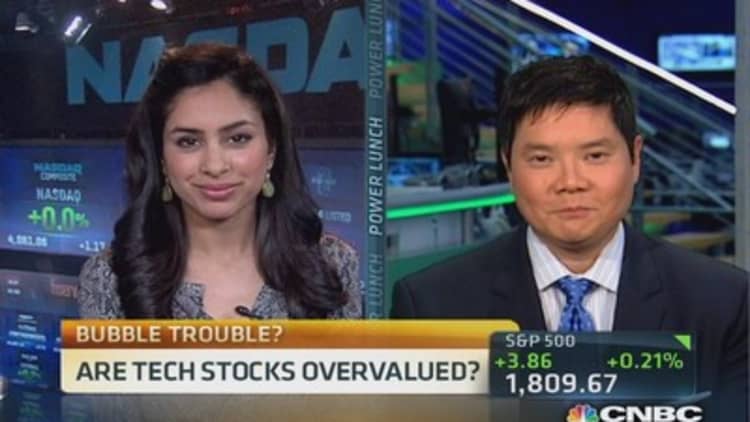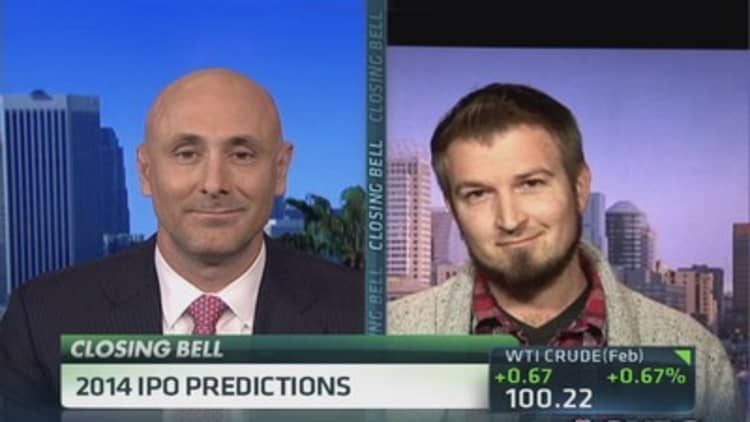Fab.com, an online retailer selling affordable high design, last year seemed as if it could be the next Amazon.
Just a few months later, however, it looked as if it could become the next Pets.com.
(Read more: Here's what the2014 tech IPO pipeline looks like)
Big-name venture capitalists, including the Andreessen Horowitz firm, poured money into the company over the last few years, lured by its startling growth rate. After raising some $170 million in venture funding, Fab accepted an additional $150 million in June, a round that valued the company at $1 billion and vaulted it into the club of billion-dollar technology start-ups that include Snapchat, Pinterest, Evernote, Spotify and Dropbox.
But by the end of the summer, Fab had fallen from that elite. Amid financial trouble, it fired hundreds of employees. A company co-founder and the chief operating officer left the company. Its valuation sank below $1 billion, leaving some investors underwater.
More from the New York Times:
Tech companies press for a better retail experience
A lot changes in tech over four years and 1000 blog posts
Too few girls and minorities study tech subjects
The rise and stumbles of Fab demonstrate how swiftly the fortunes of start-ups can change. At the company's giddy high point, it also illustrated why some billion-dollar-plus valuations have raised concerns of a new dot-com bubble.
"Predicting what's undervalued and what's overvalued is fabulously hard," said Josh Lerner, a professor of entrepreneurship at Harvard Business School. "It's a trope to see a young, highly valued company and say it's wrong, but sometimes it is."
Fab declined to comment for this article.

The growth of the billion-dollar club has eclipsed the exuberance of more than a decade ago.
In the three years from 2011 through 2013, there were at least 34 investments that valued companies at $1 billion or more, according to Dow Jones Venture Source, compared with 16 from 1998 to 2000.
Yet it is more than a speculative frenzy that is driving up the valuations of these companies. A number of changes in the capital markets, the venture capital industry and the public equity markets have conspired to make it easier than ever for unproven start-ups to be valued at $1 billion or more.
Patrick T. Fallon for The New York Times Venture funds were competing with one another to invest in Lyft, a ride-sharing service.
For one, the stock and merger markets have demonstrated that many companies' high-flying valuations are justified. Facebook's stock has surged after its early stumbles. Newly public companies like Twitter are performing well. And Instagram and Tumblr both sold for more than $1 billion each, emboldening venture capitalists.
(Read more: Five memorable tech IPO moments)
"A number of high-profile companies in the social media space have been successful," Mr. Lerner said. "It's creating a feedback loop."
Another factor driving up valuations is the 38 percent rise last year in the Nasdaq composite index, which is heavy with technology companies. For venture investors eager to find the next big thing, the healthy stock market acts as a green light to keep pouring money into private companies that might go public or get sold.
"There's always this long and almost irrational exuberance tied to the enthusiasm, excitement and growth of a company when the economy is doing well," said Jayshree Ullal, chief executive of Arista Networks, a cloud networking company reportedly valued near $2.5 billion.

What's more, the availability of cheap financing for companies and investors, which has helped buoy the stock market, is allowing investors to easily finance deals and borrow money.
Pension funds and endowments are putting more money into venture funds. In the third quarter, venture capital firms raised $4.1billion, an increase of 28 percent from the previous quarter, according to the National Venture Capital Association.
And with so much cash to deploy, venture funds are competing with one another to invest the money, a process that often drives up valuations.
When the ride-sharing service Lyft was seeking to raise a new round of funding last year, many firms, including Greylock Partners, were interested in investing. But before they could offer Lyft any cash, Andreessen Horowitz swooped in with an offer that Lyft could not refuse, according to people briefed on the situation.
Andreessen Horowitz is known in Silicon Valley for such tactics, having had success with companies like Facebook, Twitter and Skype. According to CB Insights, which tracks venture investing, the average size of the firm's investment was substantially higher than those of rivals New Enterprise Associates and Greylock.
(Read more: Disruptions: If it looks like a bubble and floats like a bubble …)
But Andreessen Horowitz is not alone. In the third quarter, venture capital firms invested $7.8 billion, an increase of 12 percent from the previous quarter, according to the venture capital association and Pricewaterhouse Coopers.
The competition is especially tough when it comes to later-stage investments in the most admired billion-dollar tech companies, a group that includes such companies as Square, Box and Uber.
And the fight is becoming more fierce as new investors jockey to compete with venture funds. Competition from later-stage investors like Meritech Capital, Institutional Venture Partners and hedge funds like Tiger Global and Valiant Capital Management has driven up valuations.

These funds expect lower returns than venture capitalists, so they take less risk by investing in more mature companies that are safer bets.
"If you've got funds and you need to basically deploy pretty big chunks of capital, wouldn't you rather invest in things that seem like a sure thing?" said Aileen Lee, founder of Cowboy Ventures. In a widely read blog post on tech companies worth more than $1 billion, Ms. Lee called the group the "Unicorn Club."
Last May, Evernote, a company that makes a productivity app, raised money that drove the valuation significantly higher.Just seven months later, interest from Valiant, a hedge fund based in San Francisco that also invested in Dropbox, and AGC Equity Partners' affiliate m8Capital, elevated the valuation to a reported $2 billion.
For those venture firms that aren't able to invest in the top companies, the inclination is to spread out their investments among a broad pool of companies, many of which are derivative.
(Read more: The most-overlooked metrics for valuing tech firms)
When the deals site Groupon was thriving,for example, big investors including Amazon poured money into rival Living Social. For a time, the company was valued at more than $1.5 billion. But in February, Living Social took $110 million in new funding at a lower valuation, a so-called down round.
"These funds have a lot of money and push money out into whatever looks hot," said Alexander Ljungqvist, professor of finance at New York University."It's like throwing spaghetti at the wall and seeing what sticks."
With so much cash in the bank, many companies that in previous cycles might have been prompted to sell or go public can now stay private longer — a strategy they saw Facebook use with success.
"That's why you're seeing LinkedIn,Twitter, etc., going out at $20 billion valuations instead of a billion like eBay or Amazon," said John Backus, founder of New Atlantic Ventures and a member of the National Venture Capital Association board. "There's a lot more value accruing to the private investors."

And the rise in so-called secondary offerings, which allow executives and early employees to sell some of their shares when the company is still private, is driving up valuations as new investors compete for a limited number of shares on the secondary market.
Some find recent valuations unreasonable.
"I don't know any other way to value a company than to look at its future cash flow and compare it to current cash flow," said Brian Hamilton, the chairman of Sageworks, which analyzes the financials of private companies. "Where we are today, I don't see where the values are coming from based upon any judicious or even very optimistic view of a company's future cash flow and revenue."
But many investors contend that young companies will one day justify their eye-popping valuations.
(Read more: Investors run to Europe for next hot tech start-up)
"Valuations are never a reflection of today's performance, it's a reflection of the future opportunity," Ms. Ullal of Arista Networks said. "Most of these companies grow into their valuations nicely and those that don't fall by the wayside."
And technology boosters note that the market for Internet companies is larger than it was 15 years ago.
"In the last cycle, there were barely 500 million people online, and they were all on 56k modems," said David Lee of SV Angel, a nearly-stage investor. "By 2015, there will be five billion people with a supercomputer in their hands."
Still, to some, Fab and other companies that attain high valuations are a sign that too much money is chasing too few good ideas.
"This is a drama that has played out many times before," said Mr. Lerner of Harvard. "The music inevitably stops at a certain point."

